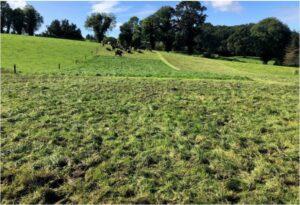Get a 24 hour weather forecast

With the wet spring some damage may have been done to paddock.
Minor poaching
In minor poaching cases, the plant is able to repair itself reasonably quickly and tiller density quickly returns to normal.
Moderate poaching
In moderate poaching events grass seed should be broadcast or over-seeded once the ground has firmed up.
Severe Poaching
After severe poaching events the paddock will need to be properly re-seeded.
A pasture will return without doing anything but it will be dominated by weed grasses that will produce much less usable food for stock. If drainage is an issue, it must be addressed before reseeding takes place.
Success is dependent on getting as much seed-to-soil contact as possible and having moist conditions post-germination. The best time for over-seeding is late April just before the cows come to graze the paddock again, (The cow’s feet push the seed into the ground and so it quickly germinates), or mid-summer (after silage cuts). By the next grazing the new grass plants will still be too small to be grazed by the cows but they will respond to receiving direct light and will grow quickly. The addition of more grass seed will have a big impact on reducing the invasion of weeds. By the third grazing they will be a normal part of the sward.
The more open the pasture, the more likely that over-seeding will be successful. Use a tetraploid (bigger seeds) grass variety, or a mix with a strong tetraploid inclusion.
Oversowing in practice:
– Spread 6-8kgs of seed per acre.
– Spread a compound fertiliser (1.5-2 bags/ac), either 18:6:12 or 10:10:20 (where a farm has a P allowance). The P will help with root development and establishment.
– Allow the cows to walk the seed in or roll with a light roller, avoiding soil compaction.
– Apply slug pellets where needed.
– Ensure the pasture is grazed frequently at light covers to assist seedling germination and tillering.
Over-seeding will not work if seeding is followed by dry conditions so, if this happens, continue to spread light levels of slurry (1,000-1,200 gallons/ac) or soiled water after grazing.
Consult your Dairygold Area Sales Manager today for more information.